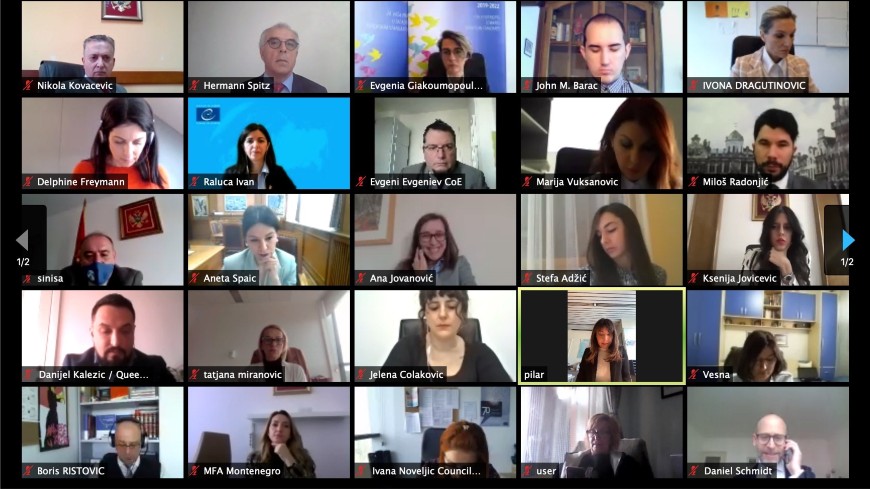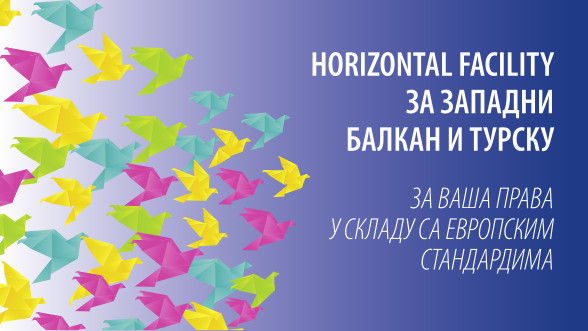The European Union and the Council of Europe remain crucial partners of authorities of Montenegro in ensuring better protection of rights of Montenegrin citizens. Protection of human rights, building of a strong and independent justice system and of an inclusive society, where freedom of expression and media are guaranteed, need to remain priorities of Montenegro on its European path. This has been underlined in today’s second meeting of the Beneficiary Steering Committee of the joint EU/CoE programme “Horizontal Facility for the Western Balkans and Turkey 2019-2022”, held online.
On this occasion, Ljubomir Mišurović, State Secretary of the Ministry of Foreign Affairs of Montenegro, reiterated that Montenegro will stay firmly committed to respecting human rights and freedoms. “I would like to congratulate the Council of Europe Programme Office in Podgorica and the EU Delegation in Montenegro on an excellent work within the Horizontal Facility so far. This programme has proved and continues to demonstrate how governmental institutions in co-operation with the civil sector comply with the European standards, whereby reflecting the importance of human rights, rule of law and democracy”, he concluded.
Hermann Spitz, Head of the Co-operation, Delegation of the European Union to Montenegro underlined that the reforms in the area of the rule of law and fundamental rights are core values of the EU and they determine the overall pace of EU accession negotiations. “Our joint programme with the Council of Europe is assisting the Montenegrin institutions to make progress in all important areas such as ensuring justice; fighting corruption and economic and organised crime; promoting antidiscrimination and protection of the rights of vulnerable groups and freedom of expression and media. We encourage Montenegro to take advantage of the expertise offered and to pursue a transparent and inclusive approach in the implementation of the reforms in the area of rule of law”, he said.
Pilar Morales, Head of the Programming Department, Office of the Directorate General of Programmes, Council of Europe highlighted that “despite the challenging circumstances of the health crisis, the Council of Europe, together with its longstanding partner the European Union, will continue bringing prompt reactions to further strengthen the well-established co-operation with Montenegro, while paving the way on its EU path and supporting implementation of the recommendations of Council of Europe monitoring bodies”.
Vladimir Leposavić, Minister of Justice, Human and Minority Rights underlined that the majority of aspects of the rule of law begin with the European standards. “The European community expects Montenegro to remain committed to the best European practices and standards, which is why the support of this programme is much appreciated”, he stated. “I invite all relevant actors – the Council of Europe, judiciary, civil society organisations, to remain open to co-operation and keep the dialogue on improvement of the work of Ministry of Justice active”, concluded minister Leposavić.
“Our goal is to be at the service of all citizens of Montenegro, preserving stability and peace, and at the same time respecting human rights and freedoms”, stated Sergej Sekulović, Minister of Interior of Montenegro in his remarks. “There is no progress without the co-operation between the citizens and the authorities. Trust is needed for that to happen. Our main message is – let us build trust”, he added.
Tamara Srzentić, Minister of Public Administration, Digital Society and Media of Montenegro said: “We are focused on media legislative reforms, completing the Audiovisual Media Services Law and amendments to the laws on media and RTCG, so that all three laws could be harmonised and adopted as a package. Following the discussions and feedback from the media community and civil society, we have noted that the protection of journalistic sources and the selection procedure for the members of the Council of RTCG would be one of the most important areas for aligning these laws better with the local needs and best practices. Both previously adopted media laws will be amended to a very narrow extent, in line with the recommendations of the Council of Europe.”
“One of the most significant tasks in the forthcoming period will most certainly be the development of teachers' digital competencies, as well as work on their competencies aimed at tackling crisis-ridden, unforeseeable and complex situations”, said Vesna Bratić, Minister of Education, Science, Culture and Sports of Montenegro. “Not only have the teachers moved to virtual classrooms, but they have found themselves in those classrooms along with their students, and the students, I dare say, find digital civic competence vitally important and its overriding importance will only increase as times goes by”, she said.
***
The joint European Union and Council of Europe programme “Horizontal Facility II” was created as a co-operation initiative to assist Beneficiaries in the Western Balkans and Turkey to comply with the European standards.
In Montenegro €4.7 million have been allocated for seven actions, covering all the key areas of the Horizontal Facility - justice reform, human rights protection, prison and police reform, fight against economic crime, fight against discrimination and inclusive education, as well as freedom of expression and freedom of the media.
Despite the effect that COVID-19 pandemic had on the implementation of the actions under the Horizontal Facility II in Montenegro, notable results aiming to advance Montenegro’s reform agenda and EU accession negotiations were achieved.
In the field of ensuring justice, important work has been devoted to strengthening procedural safeguards on judicial proceedings and building capacities of lawyers and notaries. A legal clinic on human rights was launched for the first time in Montenegro, offering the law students an opportunity to provide free legal assistance on issues related to domestic violence, protection of women, children and gender minorities. Also, gender equality principles were incorporated into the new/revised draft codes of ethics of lawyers, notaries and court interpreters. Prison authorities started working on identification of potentially radicalised prisoners in the previous year.
Under Action against economic crime, the Government of Montenegro adopted The National Money Laundering/Terrorist Financing (ML/FT) Risk Assessment, drafted with the technical assistance provided under Horizontal Facility. In addition, the Financial Investigation Unit of Montenegro was readmitted to the Egmont network, following the recommendations for legislative changes provided through the action.
In the field of promotion of diversity and equality, co-operation with civil society organisations was strengthened. Through their grants, CSOs responded to urgent needs of the vulnerable groups in times of pandemics - counselling sessions and discussions on hate speech with LGBTI community members were organised and Roma community was reached out to, as well. In order to ensure quality education for all in Montenegro, the Ethics Committee was supported in developing the Charter of Ethics as a key document for its work and as a follow-up to the Law on Academic Integrity. Also, of local school-based projects are providing useful links and bridges to reach out to vulnerable groups and students in a meaningful way.
Focusing on freedom of expression and freedom of the media, the programme contributed to the improved Draft Law on Audiovisual Media Services, that will allow for the application of European standards in this area. In addition, support has been provided to media outlets, including through grants, to promote freedom of expression and overcome risk faced during pandemics.


